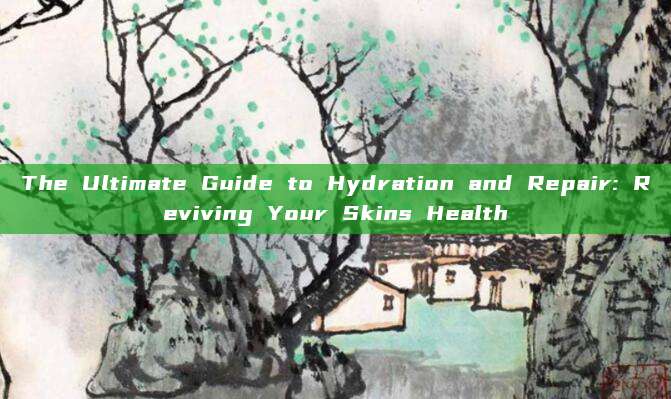Introduction:
In the quest for healthy, glowing skin, two key terms often crop up: hydration and repair. But what exactly do these terms mean, and how can you achieve both? In this comprehensive guide, we'll delve into the world of hydration and repair, exploring the best practices, products, and insights to keep your skin looking and feeling its best. So, let's jump into the essentials of hydration and repair, as recommended by leading dermatologists and skincare experts.
The Importance of Hydration:
Hydration is the cornerstone of healthy skin. When your skin is well-hydrated, it appears plump, supple, and full of life. The skin's outer layer, known as the epidermis, is primarily made up of water, and maintaining its optimal hydration level is crucial for its integrity and function. According to a study published in the Journal of Investigative Dermatology, "Water plays a fundamental role in the structure and function of the skin, and adequate hydration is essential for skin health."

Understanding Hydration and Repair Products:
To achieve optimal hydration and repair, it's essential to use the right products. Skincare brands have developed a wide range of products, from serums to moisturizers, specifically designed to tackle both issues. Here's a breakdown of some key ingredients and their benefits:
1、Hydrators: Hydrating ingredients, such as hyaluronic acid, glycerin, and squalane, attract and retain water in the skin, providing immediate and long-lasting hydration. According to a report by the Global Information, Inc., the global skincare market, which includes hydrating products, is expected to reach $269.3 billion by 2025.
2、Antioxidants: Free radicals, which are unstable molecules, can damage the skin's cells and contribute to aging. Antioxidants, such as vitamin C, vitamin E, and ferulic acid, neutralize free radicals and protect the skin from oxidative stress.
3、Retinoids: Retinoids, a class of vitamin A derivatives, are known for their anti-aging properties. They boost collagen production, improve skin texture, and can even reduce the appearance of fine lines and wrinkles. A study published in the Journal of the American Academy of Dermatology found that retinoids are effective in treating photoaging and improving skin texture.
4、Peptides: Peptides are short chains of amino acids that stimulate collagen production and help repair damaged skin. They can also enhance the effectiveness of other skincare ingredients.
Practical Tips for Hydration and Repair:
1、Cleanse Your Skin: Start with a gentle cleanser to remove dirt, oil, and impurities from your skin. This ensures that your skincare products can penetrate and work effectively.
2、Exfoliate Regularly: Exfoliating helps to remove dead skin cells and allows your skincare products to penetrate more effectively. However, don't overdo it, as excessive exfoliation can strip the skin of its natural oils.
3、Use a Hydrating Serum: Apply a hydrating serum after cleansing to provide immediate hydration and prep your skin for moisturizer.
4、Choose the Right Moisturizer: A moisturizer with hyaluronic acid, glycerin, and other hydrating ingredients will help lock in moisture throughout the day.
5、Protect Your Skin: Use a broad-spectrum sunscreen with an SPF of 30 or higher to shield your skin from harmful UV rays, which can cause premature aging and other skin issues.
6、Stay Hydrated: Drink plenty of water throughout the day to maintain overall skin health.
Conclusion:
Hydration and repair are essential for maintaining healthy, glowing skin. By understanding the importance of these two factors and using the right products and practices, you can achieve the skin of your dreams. Remember to consult with a dermatologist or skincare expert if you have specific concerns or questions. With dedication and the right approach, your skin can look and feel rejuvenated and radiant.











